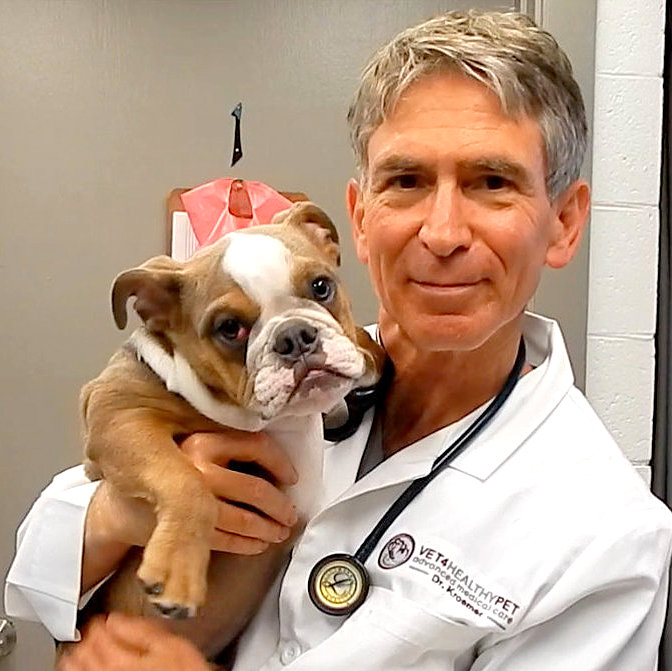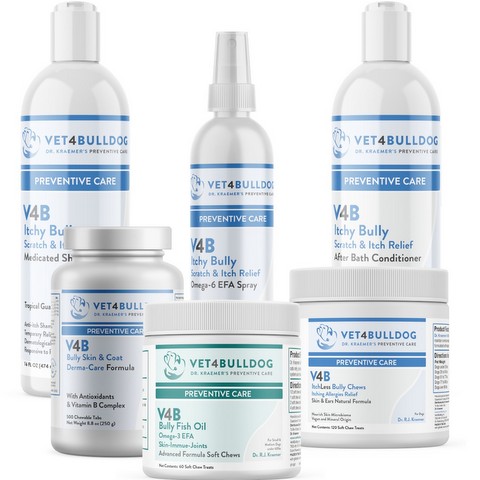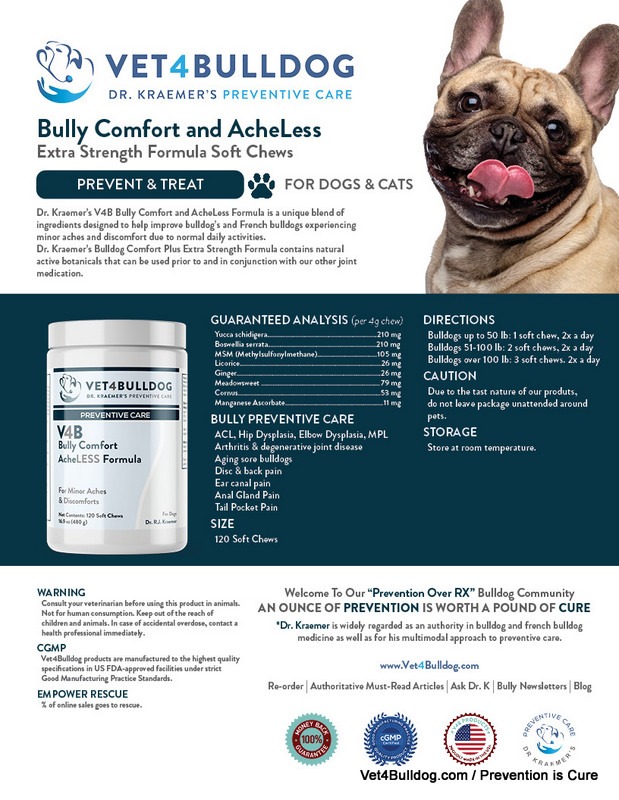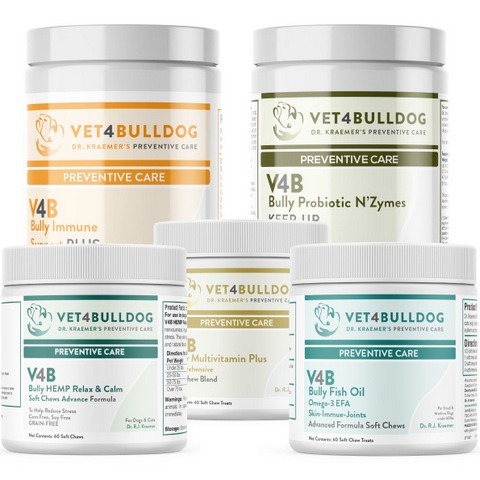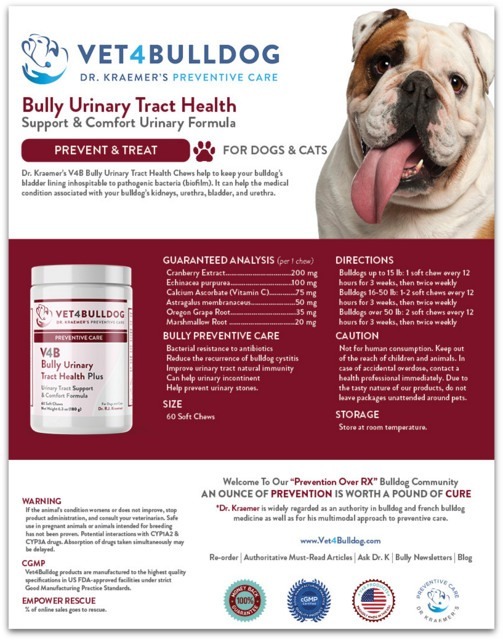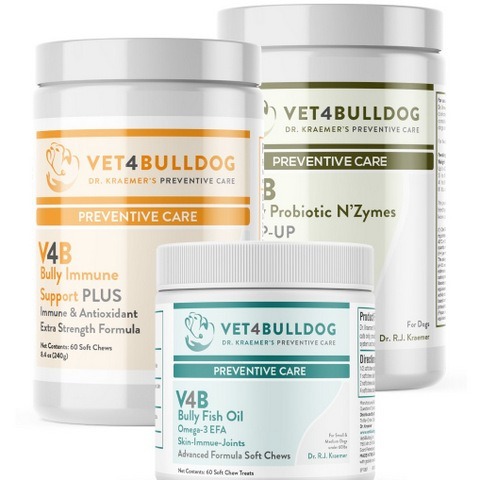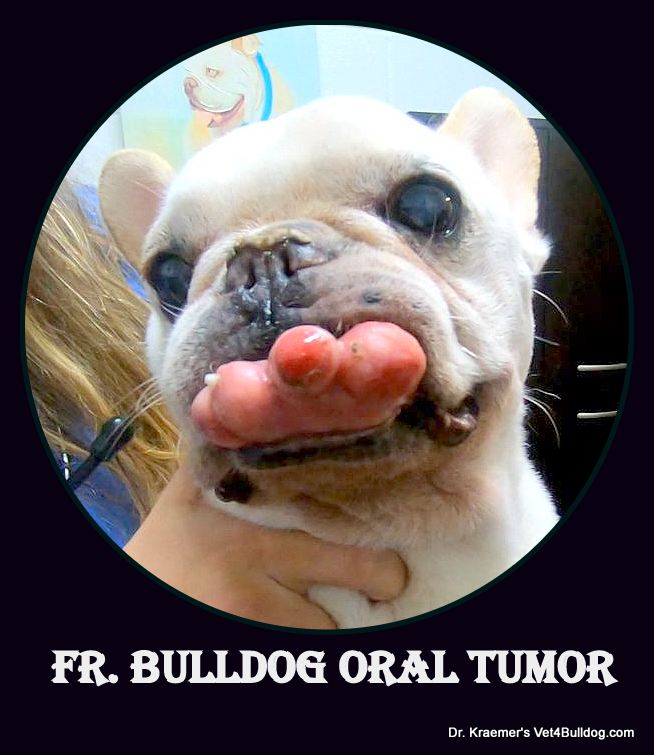Bulldog Cushings is an endocrine disease that leads to abnormally elevated levels of the stress hormone cortisone (Glucocorticoids)
Understanding the balance of cortisol levels is crucial in managing and diagnosing adrenal gland conditions in bulldogs.
WHAT IS CORTISOL?
Cortisol, a type of glucocorticoid, plays a vital role in numerous bodily functions, including
- regulating metabolism
- anti-inflammation
- helping the body respond to stress
Let’s break down the implications of low and high cortisol levels in bulldogs.
Bulldog Cushing’s Syndrom 5 X MUST KNOW
- Cushing’s is an overproduction of the adrenal gland hormone due to a pituitary or adrenal gland tumor
- The pituitary tumor accounts for 85% of bulldog Cushing’s.
- Iatrogenic Cushings can happen due to exogenous overuse of steroid medication
- When possible, it’s best to replace steroids with less harmful drugs or combine them with bully non-RX bully therapeutics
- Prevention and care include Dr. Kraemer’s Bulldog Cushing’s Bundles.
Members of this bulldog community prefer prevention over RX
LOW CORTISOL / ADDISON DISEASE (Hypoadrenocorticism)
When the adrenal glands do not produce enough cortisol, this condition is known as hypoadrenocorticism, or more commonly, Addison’s disease.
This lack of cortisol can lead to a variety of symptoms, including weakness, lethargy, weight loss, vomiting, diarrhea, and in severe cases, an Addisonian crisis, which is a life-threatening condition requiring immediate medical attention.
HIGH CORTISOL / CUSHING’S SYNDROME (Hyperadrenocorticism)
Conversely, when the adrenal glands produce too much cortisol, the condition is known as hyperadrenocorticism, or Cushing’s syndrome. This overproduction can be due to an:
- adrenal tumor
- a pituitary gland tumor that produces too much ACTH (adrenocorticotropic hormone)
- or long-term use of corticosteroid medications
Cushing’s syndrome in Bulldogs and French Bulldogs / CAUSE:
Hyperadrenal involves a complex interplay of hormonal imbalances that lead to characteristic clinical signs. Understanding the causes of Cushing’s syndrome in these breeds can help in the accurate diagnosis and effective management of the condition.
1. Bulldog Cushing’s Pituitary Tumor
Pituitary-dependent hyperadrenocorticism (PDH) is the most prevalent form of Cushing’s Syndrome in Bulldogs and is triggered by a tumor in the pituitary gland. The pituitary gland, situated at the base of the brain, produces ACTH (adrenocorticotropic hormone), which stimulates the adrenal glands to produce cortisol. The tumor is usually a secreting benign tumor and can be managed medically for many years.
85% of bulldog Cushings are PDH
2. Bulldog Cushing’s Adrenal Tumor
While less common than pituitary tumors, adrenal tumors are a significant cause of Cushing’s Syndrome in Bulldogs, accounting for about 15% of cases. These tumors arise directly in one or both adrenal glands, which are located near the kidneys and are responsible for producing cortisol.
Adrenal tumors can be either benign (adenoma) or malignant (adenocarcinoma), with about 50% having the potential to metastasize (spread to other parts of the body). Regardless of their nature, these tumors directly increase cortisol production, leading to adrenal-dependent hyperadrenocorticism. The diagnosis and management of adrenal tumors may be more straightforward, as they can sometimes be identified and potentially removed surgically, depending on their size, location, and malignancy.
50% of Adrenal Tumor will metastasize
3. Iatrogenic Cushing’s Syndrome
Iatrogenic Cushing’s Syndrome occurs as a result of an exogenous long-term or excessive administration of glucocorticoids, such as pred, for the treatment of various conditions, like:
- ITCHING ALLERGIES
- Atopic environmental
- Food Allergy
- Contact Allergy
- Flea Allergy

- ORTHOPEDIC AND ARTHRITIS
- Muscle Strain
- Ligament Tear
- Joint dysplasia
- Osteoarthritis

- BACK PAIN & NEUROLOGY
- IVDD
- Spondylosis
- Vertebral Malformation

- CANCER
- Mast Cell Tumor
- Lymphoma
- Breast Tumor
- Other


WHAT IS GLUCOCORTICOID MEDICATION?
Glucocorticoids are synthetic forms of cortisol, and their prolonged use mimics the effects of elevated cortisol levels, leading to the development of Cushing’s syndrome.
Managing iatrogenic Cushing’s involves carefully tapering off the offending medication, if possible, under the guidance of a veterinarian, to avoid withdrawal symptoms and adrenal insufficiency.
Itrogenic form of bulldog hyperadrenal is a side effect of prescribed steroids
Cushing’s Syndrome in Bulldogs and French Bulldogs / PRESENTATION
- Pot Belly: distended belly
- PU/PD: Excessive drinking, & Excessive urination
- PP: Excessive eating & weight gain
- Thin Skin: Abnormally thin skin
- Hair Loss: baldness usually dorsal back trunk area
- Pyoderma: skin infections
- Panting
- Muscle wasting
- Urine: Clear, water-like urine
- UTI: Persistent urinary tract infection
- Calcinosis Cutis: Calcium black scabby deposit on the skin
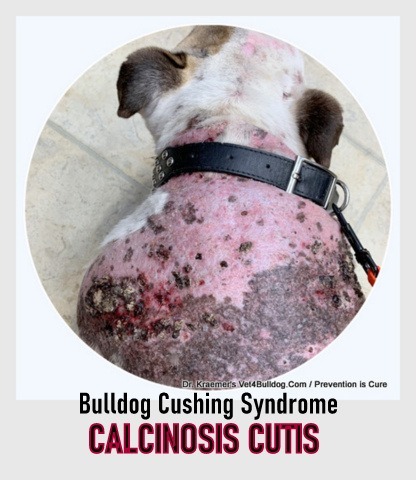
Cushing’s Syndrome in Bulldogs and French Bulldogs / DIAGNOSIS
- EXAM:
- pot belly
- thin skin
- balding
- pyoderma
- calcinosis cutis
- BLOOD:
- High liver enzymes (Alk Phos)
- Stress Leukogram (abnormal white blood cell reading consistent with stress)
- URINE CULTURE: to help rule out UTI
- URINEANLYSIS: Diluted urine (very low urine specific gravity)
- BLOOD PRESSURE: Help rule out hypertension
- ULTRASOUND: check for abnormal adrenal glands and metastatic disease
- CYTOLOGY: Skin Cytology or/and Biopsy for Calcinosis Cutis
- URINE CORTISOL LEVEL
- SUPPRESSION or STIMULATION TEST:
- Dexamethasone suppression
- ACTH Stimulation test
Cushing’s Syndrome in Bulldogs /PREVENT & TREAT
Steroids are potent anti-inflammatory and immunosuppressive agents, making them invaluable for treating a range of conditions, from allergies and skin issues to autoimmune diseases and inflammation. However, their benefits come with significant risks if used inappropriately.
We recommend judicious use of steroid medications such as:
- pred
- depo-medrol
- triamcinolone
- dexamethasone
Best Strategies to Avoid Iatrogenic Cushing’s
- Short-term Use: Whenever possible, steroids should be prescribed for the shortest duration necessary to treat the condition effectively.
- Lowest Effective Dose: Using the minimum dose that achieves therapeutic goals can help mitigate the risk of adverse effects.
- Tapering Off: For dogs that have been on steroids for a longer period, gradual tapering of the dose is essential, rather than abrupt discontinuation, to allow the adrenal glands to resume normal function.
- Monitoring: Regular monitoring of pets on steroid therapy is crucial. This involves not just watching for signs of Cushing’s but also monitoring for the effectiveness of the treatment and any other potential side effects.
- Alternative Therapies: In some cases, non-steroidal medications or treatments can be effective and might be preferred to avoid the risks associated with steroids.
SAFER ALTERNATIVES TO GLUCOCORTICOID MEDICATION
Glucocorticoids are widely used in veterinary medicine due to their powerful anti-itching, analgesic, anti-inflammatory, and immunosuppressive effects. However, their use can be associated with side effects, especially with long-term administration. In many cases, it may be possible to substitute or combine glucocorticoids with safer drugs and non-prescription therapeutics to minimize these risks. Here are some alternatives:
Bulldog Allergy and Itch Control Steroid Replcments
Use bully supplements and topical therapeutics for itch allergies and itch control
- RX
- Cyclosporin (Atopica)
- Apoeqel
- Cytopoint
- V4B Bully ItchLess Bundles
- V4B Bully Allergy Bundles
Bulldog Pain and Inflammation Control Steroid Replacements
- RX
- NSAIDs (Metacalm, Rimadyl, and Previcox)
- Analgesics (Gabapentin, Tramadol)
- Cyclosporin
- Stem Cell Therapy
- Laser Therapy
- V4B Bully PainLess and Anti Arthrhtic Bundle
- V4B Joint Support Bundle
Bulldog Back and Disc Health Steroid Replacements
- RX
- NSAIDs (Metacalm, Rimadyl, and Previcox)
- Analgesics (Gabapentin, Tramadol)
- Stem Cell Therapy
- Laser Therapy
- V4B Bully Disc & Back Bundles

Bulldog Immunity and Cancer Steroid Replacements
- RX
- Chemotherapy
- Radiation
- Bulldog Immune Support Bundles
Treating Steroid Side Effects
Steroids, such as glucocorticoids (e.g., pred, dexamethasone), are powerful drugs widely used in veterinary medicine. While they can be incredibly effective for managing a range of conditions, their use can also lead to a variety of side effects. Addressing these side effects often requires a multifaceted approach, including dietary supplements, medications, and lifestyle adjustments. Here’s how some of these side effects might be managed:
Chronic high levels of blood steroids, whether due to conditions like Cushing’s syndrome or excessive use of exogenous steroidal drugs, can indeed lead to a variety of side effects, including:
- Hypertension: Elevated steroid levels can cause increased blood pressure, which can contribute to hypertension.
- Diabetes: Steroids can interfere with insulin regulation and glucose metabolism, leading to insulin resistance and an increased risk of developing diabetes mellitus.
- Infection: Due to their increased susceptibility to infections, steroids can suppress the immune system, making individuals more prone to infections such as urinary tract infections, skin infections, and respiratory infections.
- Gastric ulcers: Prolonged steroid use can lead to irritation of the stomach lining, increasing the risk of developing gastric ulcers.
- Pancreatitis: Steroids can disrupt normal pancreatic function, potentially leading to inflammation of the pancreas known as pancreatitis.
- Orthopedic problems: Steroids can weaken bones and connective tissues, increasing the risk of osteoporosis, fractures, and tendon injuries.
- Kidney disease: Steroids can cause fluid retention and electrolyte imbalances, putting strain on the kidneys. Prolonged steroid use may lead to conditions such as glomerulonephritis, kidney stones, or even chronic kidney disease.
- Heart disease: Steroids can have several effects on the cardiovascular system
STEROID-INDUCED SIDE EFFECT REMEDIES
There are various remedies that you can integrate to help reduce the adverse effects associated with high levels of blood cortisol
1. Steroid-induced Gastrointestinal Disease
Steroids can irritate the stomach lining, potentially leading to ulcers or gastrointestinal bleeding. They may also disturb the balance of the gut microbiome.
- Anti-acid Medications: Medications such as
- H2 blockers (e.g., ranitidine)
- proton pump inhibitors (e.g., omeprazole) can reduce stomach acid production, helping to protect the stomach lining and decrease the risk of ulcers.
- Bully Probiotics These beneficial bacteria can help restore the natural balance of the gut microbiome, potentially reducing gastrointestinal side effects.
2. Steroid-Induced Hepatopathy
This condition involves liver damage or dysfunction due to prolonged steroid use, affecting the liver’s ability to function properly.
- S-Adenosylmethionine (SAM-e): SAM-e is a compound that occurs naturally in the body and can support liver health. It has been shown to improve liver function in humans and animals with liver disease, potentially helping to mitigate steroid-induced liver damage.
3. Steroid-induced Immune Suppression
Steroids suppress the immune system, which can be beneficial in autoimmune diseases but also makes the body more susceptible to infections.
- Multivitamins and Immune-Boosting Supplements: While a balanced diet is crucial for maintaining overall health, certain supplements may support the immune system.
- Bully Immne Support
- Bully Multivitamin.
4. Steroid-induced Chronic Dermatitis
The excess cortisol weakens the immune system, making the skin more susceptible to infections, allergies, and other dermatological issues. This can exacerbate the skin problems Bulldogs are already prone to, such as interdigital cysts, hot spots, and infections within skin folds.
- Bully Antiseptic Medicated Shampoo
- Yeasty Bully Antiseptic Gel
- Bully Skin & Coat DermaCare Tab
- Bully Fish Oil EFA
5. Steroid-induced Pressitent Urinary Track Infection
Steroids suppress the immune system, reducing the body’s ability to fight off infections, including those in the urinary tract that lead to
- Antibiotics: might be required, at least in the short term
- Bully Urinary Health Supplements: that reduce bacterial adherence to the urinary tract lining.
Bulldog Cushings economical bundles are available HERE
Cushing’s Hyperadrenal in Bulldogs/ MEDICAL & SURGICAL
Treatment can vary depending on the underlying condition
Bulldog Adrenal Cushings Treatment:
Surgery is required for benign tumors. Metastatic ones have less favorable prognoses and should be managed with medication palliatively.

Bulldog Pituitary Cushings Treatment:
Lifelong medication and diligent monitoring are required.
- Mitotane (lysodren)
- Nizerol
- Trailstane
Trailstane is the most commonly used drug
Bulldog Itrogenic Cushings Treatment:
It usually requires tapering down the exogenous use of steroids, most of which are in the form of prescription pred for the management of itching allergies.
Cushing’s Hyperadrenal in Bulldogs/ TIPS & WARNINGS
BULLDOG CUSHINGS CALCINOSIS CUTIS TIP
Calcinosis cutis is a skin condition unique to cushings, You can treat it with therapeutic shampoos and lotions as well as topical DMSO.
CUSHINGS THERAPEUTIC BULLY TOPICALS TIP
Pred and other forms of steroids are often prescribed for itching allergies.
To help limit the adverse effects of those drugs, try using or complementing with non-prescription safe supplements & topicals such as
- V4B bully-medicated shampoos, conditioners, sprays, and lotions.
- V4B Bully therapeutic bully fish supplements.
Bulldog skin & allergies economical bundles are available HERE
BULLDOG CUSHINGS AND OTHER DISEASE WARNING
Other diseases can clinically present like Cushing’s, so they must be ruled out. Examples are
- kidney disease
- diabetes (excessive drinking and urination),
- and hypothyroidism (weight gain, hair loss).
CUSHINGS STEROID RX
Bulldogs treated with oral and injectable steroids for allergies or other medical conditions could suffer from iatrogenic Cushing’s. When so, you must slowly taper off the medication.
Even topical ointment or spray steroid treatment can cause Cushing’s when used excessively and for a long duration.
BULLDOG CUSHINGS HYPOADRENAL ADDISON DISEASE
An overdose of Cushing’s prescription medication can result in a serious condition called atypical Addison, which is a depleted endogenous adrenal production of the stress hormone cortisone.
In those cases, your dog might appear unusually depressed, especially in a stressful situation. In those cases, you must avoid stress, substitute with a low dosage of pred, and see your veterinarian for testing and medication adjustments.
BULLDOG CUSHINGS ADRENAL TUMOR SURGERY
Adrenal tumor surgery can be curative but should be done by experienced surgeons and carefully monitored postoperatively
BULLDOG STEROIDS AND NSAID’S WARNING
It’s advised against using nonsteroidal and steroidal drugs simultaneously as they share similar pathways, which could lead to complications in the stomach and kidneys.
BULLDOG CUSHINGS LIFELONG MONITOR
Cushing’s disease patients who are managed on medication must be carefully monitored; routine blood tests are recommended.
Recommended by Owners Approved by Bulldog



